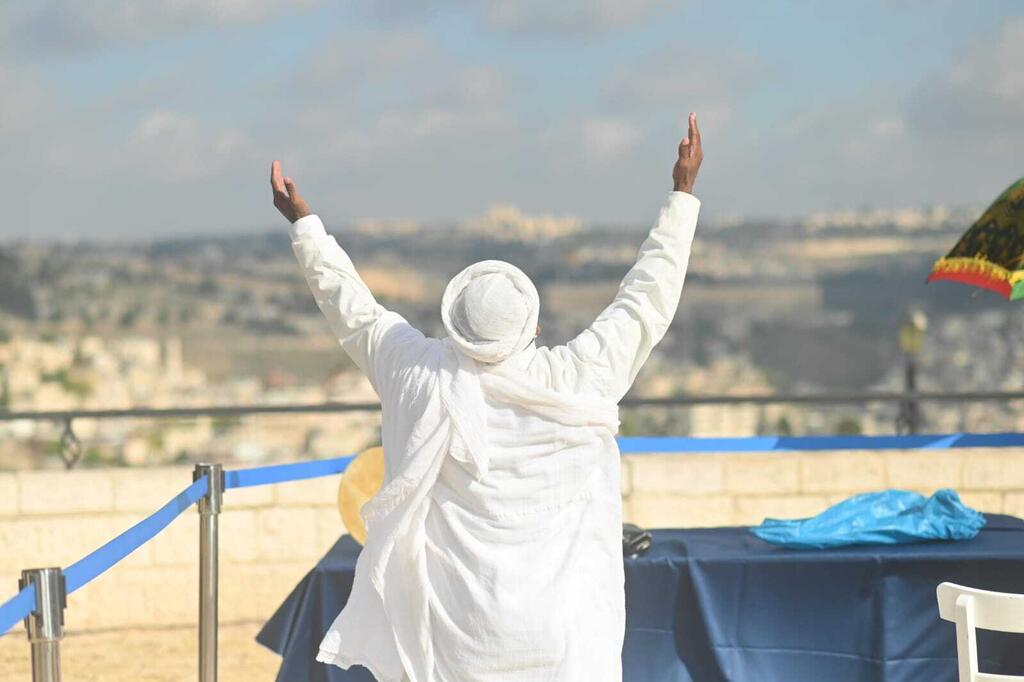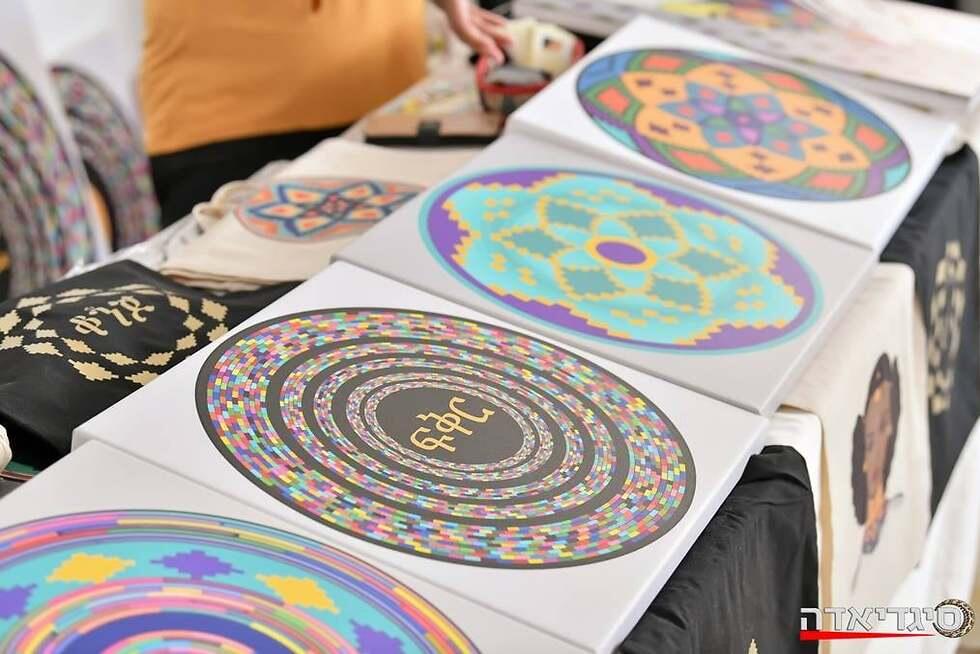This year we celebrate the Sigd holiday on Thursday, November 28, 2024. As with other Jewish holidays that fall on a Shabbat (as Sigd does this year), we move it back to Thursday. Today, against the backdrop of the Iron Swords War, the messages of Sigd—an ancient holiday, dating to the days of the First Temple in Jerusalem—take on a deeper meaning.
Once, when my wife and I were in a government office, we were asked to fill out a form, noting our places of birth. I wrote "Ethiopia," and my wife wrote "Switzerland." The clerk seemed surprised and remarked to my wife, "You left Switzerland to come to Israel? Are you crazy?" Meanwhile, he glanced at me with a look that seemed to say, "I understand you. Moving from Africa to Israel? It's an improvement in the quality of life."
This interaction made me question why the clerk assumed that people immigrating from Europe did so out of pure Zionism, while those from Africa did so out of necessity. When I shared this experience with a friend in my community, he responded, "That's not your problem. That's the clerk's problem. He simply forgot what Zionism is."
The past year has been one of pain and strength, revealing the profound qualities within Israeli society, such as sacrifice and devotion. It has been a time when families were torn apart, communities destroyed and the civilian home front bore the heavy cost of war. Yet, despite these hardships, no one, anywhere in the world, has forgotten what Zionism truly means.
In times like these, when we are all searching for an anchor and for answers, we desperately need guidance and tools to help us overcome terrible loss, despair, depression, anger, disappointment, fear and frustration. What we need is a bit of the secret of the Sigd holiday in order to imagine a better reality that brings us hope.
In this context, I am reminded of the time I sat with my grandfather in a village in Ethiopia, listening to him recount the promises of the prophets of Israel regarding the future gathering of the exiles to Zion. He especially loved sharing the vision of the reanimation of the dry bones, recounted by the Prophet Ezekiel.
Once, knowing that this story is a metaphor for the people of Israel coming back to life and returning to their land, I asked him, "When will we reach Jerusalem?" He replied, "Now!" Confused, I asked, "When is now?" He answered, "Right now; we'll reach Jerusalem soon." His grandfather had also promised him they would return to Israel, saying, "We'll be going to Jerusalem now!" It seems that each generation has promised the next generation that "now" is the time.
Despite periods of darkness and gloom, we have managed to hold on to our hope. Even in the lowest moments, we have found ways to rise, recover and keep moving forward. Hope doesn’t guarantee a happy ending, but it gives us the strength to persevere and look toward tomorrow.
As we read in Isaiah 25:8: "And the Lord God will wipe away tears from all faces; the rebuke of His people He will take away from all the earth; for the Lord has spoken.” Sometimes hope becomes reality, and this three-thousand-year-old dream comes true. Today we're home.
The Sigd holiday calls us to renew our covenant with God and with each other. This covenant holds a significant place in Ethiopian Jewish culture; it is based on loyalty between villages and an unwavering commitment that transcends changing moods and times. It exists alongside a deep commitment to mutual support, an oath to stand by one another in life's challenges. Such a covenant provides hope and security for all involved.
Unlike a contract or treaty, this covenant is written in the heart, born from complete trust. While it may weaken over time, the Sigd holiday invites us each year to engage in public soul-searching, offering an opportunity to renew our commitments and strengthen the bonds between our “villages.”
The Sigd holiday urges us to halt the cycle of mutual accusations and the cynical discourse that divides us into camps. It challenges the notion that those who are "our people" are automatically good while those who are "not our people" are inherently bad or dangerous. This divisive rhetoric is prevalent in political discourse but can be countered by the encouraging interactions we experience daily in civil society—interactions that bring people closer together and inspire hope.
Today’s political discourse often becomes partisan, focusing on immediate gains for specific groups rather than fostering a broad, inclusive vision. In such an environment, we may witness betrayal of public trust, manipulative lies and empty promises serving personal agendas. The Sigd holiday offers a remedy: it encourages us to weaken political discourse while strengthening social dialogue.
Similar to the ceremony at Mount Sinai, the Sigd holiday calls us to ascend God’s mountain with humility. In Ethiopia, we celebrated the holiday by actually climbing a mountain. Some who ascended carried stones as symbols of submission before God.
This holiday asks us to approach every situation with modesty and a sense of shame rather than arrogance. This path helps us avoid falling into a static state of reactivity filled with guilt, hatred and a desire for revenge. It teaches us to reflect on ourselves and shift from a discourse of guilt to one of personal responsibility.
The Sigd holiday encourages us to carry a stone on our shoulders as a reminder to lower ourselves and recognize the depths of others' souls. It invites us to see that what may appear as "craziness" or deviation from the norm is actually something that can be understood and contained. This journey allows us to return our discourse to our core values—principles of mutual respect—and enhances our sense of shared destiny.
In light of the events since the October 7 attack, it seems difficult to find any group in Israeli society that has remained indifferent or has not undergone some process of Israeliization. This ties into one of the central characteristics of the Sigd holiday—the value of equality.
In the theological concept of “Bete Israel” (Ethiopian Jewry), there is a fundamental belief that all individuals—Jews, Christians, Muslims and others—are part of the divine entity in equal but different ways.
Get the Ynetnews app on your smartphone: Google Play: https://bit.ly/4eJ37pE | Apple App Store: https://bit.ly/3ZL7iNv
This principle of equality has been starkly evident in the military funerals I've attended since October 7. In these solemn moments, all partitions that separate people collapse, creating a profound sense of unity reminiscent of the Jewish people’s standing on Mount Sinai, which the bible records as being, "As one man with one heart."
The Sigd holiday teaches us to extend this unity beyond times of emergency and into everyday life. It urges us to stop suspecting each other, to abandon arrogance and to recognize the value in every individual. The dream of Jerusalem, once a connecting point for all Diaspora Jews, can still serve as a unifying force for different streams in Israel and around the world.
Jewish solidarity, as seen in the cooperation of activists from all sectors to accomplish our goals, demonstrates that we need everyone. The State of Israel and Diaspora Jews are mutually dependent; the strength of one ensures the safety of the other.
Moreover, the Sigd holiday asks us to broaden our concept of who are "we the Israelis" from a sectoral to a national perception, recognizing that the fates of all of our citizens—Christians, Circassians, Berbers, Muslims, Druze and Jews—are intertwined. The Sigd holiday provides an opportunity to renew our covenant, restore hope and rebuild mutual trust among the diverse groups that compose Israeli society.
- Rabbi Dr. Sharon Shalom is a senior lecturer and founder and director of the International Center for the Study of Ethiopian Jewry at Ono Academic College in Kiryat Ono. He is also the pulpit Rabbi of the Kedoshei Yisrael Congregation in Kiryat Gat.





